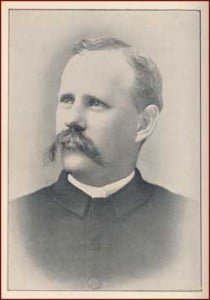Presbyterians ought to know Presbyterianism.
Our series earlier this month, TEN REASONS FOR BEING A PRESBYTERIAN, was well received. So taking that encouragement, our plan is to now present each Saturday for the remainder of this summer a chapter from the little book PRESBYTERIANISM FOR THE PEOPLE, by the Rev. Dr. Robert P. Kerr. Today we present Chapter I.
 This little volume is not for theologians. There are many abler and more elaborate works on Presbyterianism written for them. It is for the people—the busy, earnest people, who have neither the time nor the taste for an extensive study of this subject, but who ought to know—at least, in a general way—what Presbyterianism is, what it has been in the past, what it believes and teaches. In his pastoral work the author has often wished for such a book, and he earnestly hopes that this one may help supply what he believes to be a real need of the Church. For it he asks the blessing of God and the favor of the people.—R.P.K.
This little volume is not for theologians. There are many abler and more elaborate works on Presbyterianism written for them. It is for the people—the busy, earnest people, who have neither the time nor the taste for an extensive study of this subject, but who ought to know—at least, in a general way—what Presbyterianism is, what it has been in the past, what it believes and teaches. In his pastoral work the author has often wished for such a book, and he earnestly hopes that this one may help supply what he believes to be a real need of the Church. For it he asks the blessing of God and the favor of the people.—R.P.K.
[Robert Pollock Kerr, 1850-1923, pictured at right]
CHAPTER I. — THE STUDY OF PRESBYTERIANISM.
The Presbyterian Church, including all its branches, is the largest Protestant organization in the world. Its communion embraces people of every civilized nation, and it is recognized as one of the great forces of Christendom. Its members have acted a distinguished part in literature, philosophy, science, art and government, as well as in religion, and many of the great names of history are found on its rolls. It has been identified with nearly all great movements looking to the advancement of the highest interests of mankind, in Church and in State. Liberality and breadth of vision have at all times characterized this branch of the Church of Christ. The Presbyterian Church has never been sectarian in its treatment of other denominations, but has acknowledged the churchship of all bodies which hold the fundamental doctrines of Christianity, offering fellowship even to those who would not hold fellowship with it, receiving their members at its communion-table and their ministers into its pulpits.
Indeed, in many cases, Presbyterians have been so liberal as to neglect the study of their own peculiar institutions. Thousands of them are in ignorance of the history of their Church and of the high place it holds among the denominations. A boastful spirit is not to be desired, but Presbyterians ought to know Presbyterianism. They have been noted for the study of the great doctrines of religion rather than of forms of government and worship or of their own peculiarities. In other words, they have studied Christianity more than they have studied Presbyterianism. This is right, but they have gone too far. In doing one they should not have left the other undone. The Shorter Catechism, which was drawn up, in connection with other standards of doctrine, by the Westminster Assembly, in London, in 1646, and which is our great theological text-book, is so thoroughly unsectarian that it has been freely used by other denominations for the instruction of the young, and in some instances by persons who did not know that it was a Presbyterian catechism; for the word “Presbyterian” does not occur in the book.
The study of Presbyterianism need not make men bigoted or exclusive, but should contribute to their efficiency in the grand army of God. The cavalry ought to understand cavalry tactics, the infantry and artillery should master their own respective departments, and all should fight harmoniously, side by side, for one great end.
It is hoped that the perusal of these pages may not tend to sectarianism, but that it may help some Presbyterians to a better understanding of the peculiarities of the Church to which they belong. These peculiarities refer to government and doctrine, and may be described as ecclesiastical republicanism combined with Calvinistic theology.. The subject will be examined under these two divisions, prominence being given to the former, as that is our own peculiar possession, Calvinistic theology being held by several other churches in common with our own.
Tags: London, Westminster Assembly
-
This book or rather a précis of it NEEDS to be reprinted olong with the 10 reasons why I am a PRes. From your former articles. very much needed today. PLease consider. THanks for your very interesting historical blog. We in NEw Zealand also apprecate then. Keep up the good work. Regards robert Vette

1 comment
Comments feed for this article